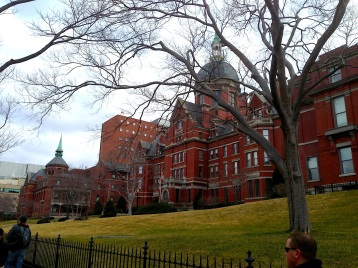 Kenneth J. Pienta is the Donald S. Coffey Professor of Urology at the Brady Urological Institute of the Johns Hopkins University School of Medicine. He is also a Professor in the Departments of Oncology and Pharmacology and Molecular Science and serves as a faculty member in the Cellular and Molecular Medicine Program at the Johns Hopkins School of Medicine and is a Professor of Chemical and Biomolecular Engineering in the Whiting School of Engineering at Johns Hopkins University. Dr. Pienta is a two-time American Cancer Society Clinical Research Professor Award recipient. He serves as the Director of Research for the Brady Urological Institute. Opened in January 1915, The Brady Urological Institute was the only one of its kind in the country. It was the number one Urological Institute in the USA for 21 years is a row 1991 – 2011 and is currently rated the #1 Department of Urology by US News. Dr. Pienta was the Associate Vice President for Research, Health Sciences, for the University of the Michigan 2012-2013 and Director of Precision Medicine for the Michigan Center for Translational Pathology from 2008-2013.
Kenneth J. Pienta is the Donald S. Coffey Professor of Urology at the Brady Urological Institute of the Johns Hopkins University School of Medicine. He is also a Professor in the Departments of Oncology and Pharmacology and Molecular Science and serves as a faculty member in the Cellular and Molecular Medicine Program at the Johns Hopkins School of Medicine and is a Professor of Chemical and Biomolecular Engineering in the Whiting School of Engineering at Johns Hopkins University. Dr. Pienta is a two-time American Cancer Society Clinical Research Professor Award recipient. He serves as the Director of Research for the Brady Urological Institute. Opened in January 1915, The Brady Urological Institute was the only one of its kind in the country. It was the number one Urological Institute in the USA for 21 years is a row 1991 – 2011 and is currently rated the #1 Department of Urology by US News. Dr. Pienta was the Associate Vice President for Research, Health Sciences, for the University of the Michigan 2012-2013 and Director of Precision Medicine for the Michigan Center for Translational Pathology from 2008-2013.
Currently, Dr. Pienta is involved in research to define the tumor microenvironment of prostate cancer metastases, as well as developing new therapies for prostate cancer.
Between 1995-2013, Dr. Pienta was the Director of the Prostate Specialized Program of Research Excellence (SPORE) at The University of Michigan. He has a proven, peer-reviewed track record in organizing and administering a translational research program that successfully incorporates bench research, agent development, and clinical application. Dr. Pienta has international expertise in the development of novel chemotherapeutic programs for prostate cancer and has championed the concept that translational research is often best accomplished by multi-disciplinary teams of scientists and clinicians. Under his direction, the success of these endeavors led to the receipt of the 2007 first annual American Association for Cancer Research Team Science Award.

The Brady Urological Institute is housed in the Marburg Building
He is the author of more than 370 peer-reviewed articles, and been the principal investigator on numerous local and national clinical trials. Throughout his career, Dr. Pienta has effectively mentored more than 40 students, residents, and fellows to successful careers in medicine.
NEW STUDY OPEN!!!!!
A pilot study of mobilization and treatment of disseminated tumor cells in men with metastatic prostate cancer
Who is this study for: Men with metastatic prostate cancer to the bone, planning to undergo chemotherapy treatment with docetaxel (also called taxotere).
Main Objective of the Study: Determine if the study drug (burixafor) can push metastatic prostate cancer cells out of the bone and into the blood, where we believe they will be more sensitive to chemotherapy.
Background:
· If prostate cancer spreads out of the prostate, it likes to go to the bone.
· We know from studies in animal models that metastatic prostate cancer cells that have settled into the bone are more resistant to therapy than those settled into soft tissues.
· We know, again from studies in animal models, that an experimental drug called burixafor can push prostate cancer cells out of the bone and into the blood, making them more sensitive to chemotherapy.
· We also know, from studies in animals, that burixafor was not harmful and did not spread the cancer.
Design: This is a 2-step study.
Step 1- Determine the best dose of burixafor to drive the metastatic prostate cancer cells out of the bone.
Step 2- Determine the effect of the chemotherapy on the metastatic prostate cancer cells that are driven out of the bone.
For more information, please contact: kpienta1@jhmi.edu
Other links:
http://en.wikipedia.org/wiki/Kenneth_J._Pienta
http://urology.jhu.edu/kennethpienta/
http://www.hopkinsmedicine.org/pharmacology_molecular_sciences/faculty/bios/pienta.html




